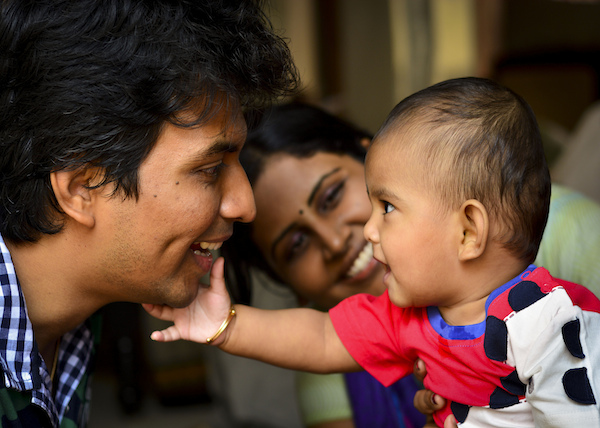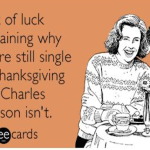It’s tough to pinpoint exactly what makes a man, but there are some simple guidelines to navigate the heart when it counts. Dr. Kristen Hick explains.
Sitting at a local restaurant patio with a girlfriend, I couldn’t help but overhear the conversation taking place between three gentlemen sitting next to me, who looked to be in their late 30s to early 40s. One would expect they were of the age of men, correct? To the untrained eye, why of course.
One guy, let’s call him “Tom,” was asking what he should text back in response to his partner, while another told him, “Say nothing, you are out with your boys. You need a night with your boys.”
I smirked to myself and listened in as the social disaster progressed. He confirmed with his “boys” his text to his partner, and then said, “And sent.”
Of course, as soon as I smirked, I gave myself away and was pulled into the conversation to give my opinion on the matter. Oh, how little they knew about what my opinion would be.
Tom—who was intensely debating on what to text his partner—explained that his wife had given birth to twins, but that his “boy” had come to visit and he wanted to stay.
Of course I congratulated him on the birth of his twins and then asked a little more. Another friend explained that they were five days old and that they were in the NICU (Neonatal Intensive Care Unit). Tom explained that he had already been at the hospital for four feedings and skin to skin care (aka Kangaroo care) that day and his wife was now texting him to come to the next feeding. He tried explaining to her that his “boy” just arrived to happy hour—all the way from Aspen, Colorado (note sarcasm)—and he wanted to know if he could Facetime with her during her feeding as opposed to returning to the hospital.
He appeared exhausted and overwhelmed. He looked to me with seeking eyes, as if to say, “Please agree with me.”
While I felt for him, and his apparent emotional and physical exhaustion, I did not agree with him.
In that moment, it became apparent that he could not stand up for himself or for his family. He could not place himself in his wife’s shoes, to imagine what terror she, the mother of his twin babies, was likely feeling.
Unlike him, she could not break free to grab a drink with friends, near or far, who may have come to visit. She is responsible for being near them when they feed (I do not know if they were able to breastfeed in their condition, but regardless, her presence is imperative for their emotional and physical survival). She likely was not able to break free to even shower daily, put on make-up or check her Facebook feed to distract herself from—what I assume is—immense worry and turmoil.
As I told him (in not such a “nice” way), there were very few excuses for being away from his wife and newborns in the NICU, and “hanging with his boys” was not one of them. It was then that I realized something.
Regardless of age, marital status, professional success, ability to financial provide, parental status, etc. …none of this makes you a “man.” I thought I had been talking to a man, but was he really a boy dressed in men’s clothing?
What makes a man?
I will qualify my following statements, that as a woman, I may not have a whole lot of room to speak on the matter. And yet, I am compelled to do so anyway.
Being a man means…
- You choose the more difficult option when you reach the fork in the road.
- You stand up for your beliefs, and more importantly, your family in all matters—even with “your boys.” Your boys will not cook you dinner after a long day of work, wash your underwear (without judgment), sew your shirt when it’s gotten a little-too-tight, make love to you when you desire comfort and love, or watch the shows that only your significant other knows you watch.
- If she births your child, or your significant other adopts a child with you, you stand by her side as if you would go to war with anyone who would come close to making even one tear shed from her or your child’s eyes.
- You make your significant other know that your actions are always consistent with your word.
- Your word is impeccable and always expressed with the upmost of respect.
The list could go on and on, but I think this covers the important stuff.
This story obviously presents a slanted view. I’m a therapist whose caseload is in part dedicated to working with pregnant and postpartum women and women, some who are mothers, who experience relationship issues with their partner.
I consistently see and hear what expecting mother’s experience: trying to conceive, obsessively worrying about the health of their unborn child and their ability to withstand the birth process, frantically reading every baby book to form decisions around whether or not to have a natural childbirth, to use a midwife instead of an ob/gyn, the best breastfeeding methods, swaddling, sleep routines, the newest and best baby products, it goes on an on—and that’s just the first couple months of the baby’s life.
This really isn’t the point, but perhaps helpful to know my slant on the perspective.
The point is, it takes work to be a man. Just like healthy, nurturing romantic relationships, becoming a man (or woman) happens through active creation.
It happens through one deciding to step up to the plate in a powerful way, against all comments, perception, or difficulty, because you know it’s right.
The thing is, choosing to do so, doesn’t make you less of a man—it makes you a man. And the significant other in your life will appreciate you, support you, love you and respect you as the man she knew she saw in you from the moment she met you.
So, how will you set the tone of this generation of males? Are you going to be a boy or a man?
[image: via Harsha K R on flickr]











